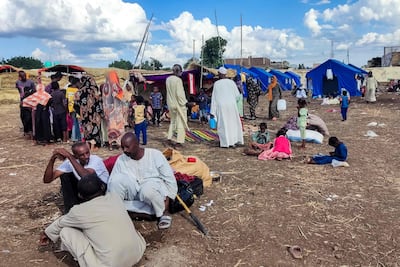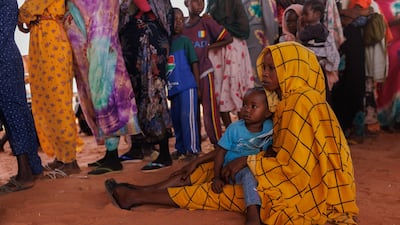A former prime minister of Sudan has urged the UK government to lead the push for more boots on the ground to protect civilians, warning that the country’s ethnic divisions are resurfacing.
Abdalla Hamdok urged Britain to use its November presidency of the UN Security Council to create safe zones for Sudanese civilians supported by international peacekeeping forces.
During a visit to the UK, where he met top diplomats and MPs, Mr Hamdok said he had raised the need for peacekeeping forces with “many people”, including the UK government. “The question is how do we make it happen. It would require a lot of mobilisation,” he said. His comments come days after UN Secretary General Anthony Guterres declined to deploy a peacekeeping force to Sudan, stating that the required “conditions do not exist”.
Mr Hamdok said he was “very much disappointed” by Mr Guterres's comments. “We have to think about enforcing a no-fly zone and having safe zones inside the country, even to the point where we should boldly talk about bringing boots on the ground to protect the civilians,” he said.

More than 12 million people have been internally displaced and 25 million face famine owing to a conflict between the Sudanese army, led by Abdel Fattah Al Burhan, and the Rapid Support Forces, a paramilitary group led by Mohamed Hamdan Dagalo, since April 2023. More than 15,000 people have been killed, and thousands have died from cholera and other diseases.
Mr Hamdok heads the civilian-led coalition Taqqadum, an umbrella group of political parties seeking an end to the war and to military rule in Sudan. The UK took up its presidency of the UN Security Council on Friday, and is also the UN pen holder for Sudan, which means it leads the drafting and negotiation of resolutions related to the country. Mr Hamdok was due to meet Foreign Secretary David Lammy, having met members of the UK's Foreign Affairs Committee.
“There is a need for more bold actions,” said Khalid Omer Yousif, a former cabinet minister who travelled to London with Mr Hamdok as part of Taqqadum. Repeating the call for safe zones, he told The National: “These actions should be taken at the level of the Security Council and at the higher level. We are advocating for the major international powers to push for these actions.”
He said more pressure was also needed to persuade the two rival generals to end their war, which has come at an enormous cost to civilians. “Sometimes the internationals are too soft in their approach to bring the fighting parties to the table and to make them commit to what they sign,” he said. “There is a need for more pressure on the two fighting parties.”
Ethnic war
The Sudanese are divided between those fighting on the sides of the two warring generals and the civilians caught in between who want peace, Mr Hamdok told the foreign affairs think tank Chatham House on Thursday. “Now you have two camps: people who are calling for peace and ending the war. And those who are the warmongers, calling for war and destruction,” he said.
A UN probe this week accused both sides of war crimes, and found the RSF was responsible for mass killings, sexual violence, and brutal assaults against non-Arab communities. The “most worrying recent development”, Mr Hamdok said, was that the two warring sides had begun recruiting along ethnic lines from the country’s diverse tribes and minority groups. “It creates a rift in our society, which would become extremely challenging to push back,” he said.

There are questions now as to whether Sudan can remain as one country, over a decade after it split with South Sudan. “The situation is leading to the partition of the country. We will end up in multiple failed states,” Mr Hamdok warned. He urged the UK to use its position to steer the international community into an “inclusive” peace process for Sudan that involves civilian community groups.
He said a “round table conference” bringing together the “widest front possible” is needed. “There is no military solution. This conflict can only be solved through a political process and through dialogue,” he said. “We hope the UK, as a pen holder, will work with us on all these things,” he said.
Hope for democracy
Sudan has been governed by the military since the republic was formed in the 1950s. There have been 17 military coups in that period, the most on the African continent. A revolution in 2019 overthrew military dictator Omar Al Bashir and led to the establishment of a civilian-led government headed by Mr Hamdok. That ended in a military coup two years later.
Mr Yousif believes the Sudanese still had “hope” for Sudan's short-lived civilian-led government. “There were many things achieved in less than two years. The war stopped all around Sudan in these two years. Sudan opened up to the world and ended isolation that happened during the Bashir era,” he said.
He hopes that any peace talks will lead to the re-election of a civilian government, and put an end to military rule once and for all. “The only way to achieve sustainable peace is through a democratic transition,” Mr Yousif told The National.
Military rule, he says, is a “root cause” of the conflict. “There should be no more engagement of the military in politics and the economy. It should just abide by its role,” he said.
Mr Yousif fled Sudan three months into the war, and is now based in Addis Ababa, the Ethiopian capital. A longtime critic of the military in Sudan, he was detained in 2022, after the military takeover.
The current international efforts towards Sudan, Mr Yousif said, are “fragmented” and focused on mediation between the two warring parties. “There is a need for a unified platform, one political, one peace process with multi-tracks,” he said. The last round of peace talks failed to achieve a ceasefire.
He suggested a revival of the Sudan Troika, when the US, UK and Norway led a peace agreement in 2005 ending two decades of civil war in the country. The Troika would work with the African Union and other regional actors to lead the peace process.
Meanwhile, Mr Hamdok’s re-emergence with Taqqadum has been mired in division. Some people feel he failed the democratic cause when he signed a power-sharing agreement with the Sudanese military after the 2021 coup. The agreement led to mass protests and Mr Hamdok’s resignation in 2022.
Mr Hamdok said that while he would lead the Taqqadum movement now, he has no intention of running to be prime minister again. “My mission ends when we stop this war,” he said.
Some critics also accuse Mr Hamdok of siding with the RSF, a charge he firmly denies. A large group of protesters chanting “peace”, “one nation, one army”, and waving Sudanese flags were outside Chatham House before his arrival, and prevented his exit.

UK MPs call for no-fly zone
The UK’s Liberal Democrats urged Prime Minister Keir Starmer to show leadership on the escalating situation in Sudan. Speaking at Prime Minister’s Questions on Wednesday, Lib Dem leader Ed Davey said: “Tens of thousands of people have been killed; 11 million Sudanese have had to flee from their homes.
“The reports of mass killings and horrifying sexual violence against women are truly stomach-churning. Will the Prime Minister make it a priority to secure a new resolution on preventing future atrocities, including a no-fly zone to stop Iranian drones?”
Mr Starmer told MPs the conflict in Sudan was not being discussed “enough”. He added that the UK was “working with international partners, including as pen holder of the UN Security Council, to end the violence, secure humanitarian access and ensure the protection of civilians is a priority.”


